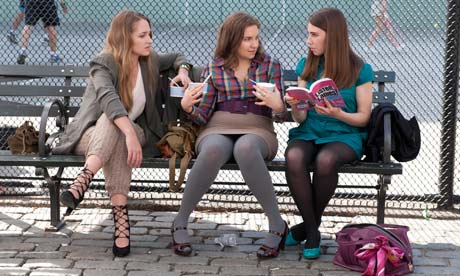Lena Dunham's love-hate relationship with self help

This week, Lena Dunham, the very talented writer and star of the HBO series Girls, got a $3.5 million advance for her first book. I mean, I really do think she's very talented, Girls is an exceptionally good TV show, and perhaps she really is "the voice of my generation...or at least a voice of a generation", as she puts it in the first episode. But $3.5 million!!
Anyway, as someone who believes that self-help is over-criticised and can sometimes genuinely help people, it interests me that Dunham's book is being pitched as an 'advice book' of witty, intelligent self-help, along the lines of Caitlin Moran's How To Be A Woman. According to a Guardian story:
The 26-year-old filmmaker told the New Yorker festival that her advice book will contain essays about sex, mortality and food. According to the New York Times, a chapter in the proposal reads: "Red lipstick with a sunburn: How to dress for a business meeting and other hard-earned fashion lessons from the size 10 who went to the Met Ball."
Dunham told the New Yorker that she is a frequent consumer of advice books and has read He's Just Not That Into You as well as Be Honest – You're Not That Into Him Either. "I didn't take either of them seriously, but I was so fascinated by the person who felt like they had gotten to a place where they were literally a dating pro," Dunham said. "That idea, that you could master the most mysterious emotion and write a book about how to handle it properly."
It's interesting she should write an advice book and admit (if that's the right word) to reading them and finding them useful, considering this scene below, from the second episode of Girls, where one of the girls shares advice from a self-help book, and another of them rails against such books for all their 'supposed tos'. Jesse says: '“I’m offended by all the ‘supposed to’s.’ I don’t like women telling other women what to do, or how to do it, or when to do it.” Meanwhile Lena sits between them taking the centre-ground position (although it is the anti-self-help diatribe that gets the best lines).
It seems like she has a sort of love-hate relationship with self-help, hating its Victorian preachiness and glib generalisations (like 'sex from behind is demeaning'), but also recognising something that's good and useful in the tradition: that perhaps sometimes self help books really do help people 'master mysterious emotions' and handle tricky situations. Perhaps she is trying to reshape the tradition for a brighter, more savvy and more ironic audience. Self-help for sarcastic New Yorkers, in other words - rather like Oliver Burkeman's excellent books and articles. Sounds good to me.
